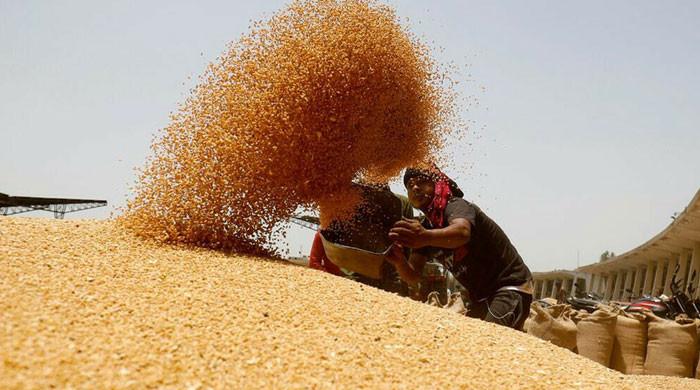AGP Report Exposes Rs300 Billion Wheat Scandal
ISLAMABAD: The Auditor General of Pakistan (AGP) has identified a staggering Rs300 billion wheat scandal for 2023-24, citing malicious intent, data unreliability, delayed responses from federal and provincial bodies, and manipulation aimed at benefiting the private sector to the detriment of local farmers and the national treasury.
While media and the public have already highlighted the irregularities, the AGP’s assessment officially validates the claims with concrete evidence, pointing to deliberate manipulation, unreliable data, and sluggish governmental action.
Over-Imports Amidst Surplus Stocks
The probe substantiated the excessive importation of wheat despite adequate reserves. It revealed that approximately 3.59 million metric tons (MMT) of wheat were brought in during 2023-24, surpassing the permitted limit of 2.40 MMT. This occurred even as Pakistan achieved a record domestic wheat production of 31.47 MMT and possessed a carryover stock of 4.64 MMT.
The report dismisses the reasons provided for these imports as entirely untrustworthy, implying a calculated effort to artificially inflate national demand estimates. The audit clearly states suspicion of malicious intent.
Inconsistencies in Key Data
Data presented to justify the imports contained numerous inconsistencies, particularly concerning opening and closing stock figures across different years. The AGP highlighted discrepancies in wheat stock numbers presented at official meetings, which significantly influenced import decisions. These inflated or deflated stock assessments contributed to ill-advised actions like excessive imports or critical delays resulting in supply shortfalls.
The report further indicates that Punjab and Sindh, key wheat-producing provinces, released substantially reduced quantities of wheat to flour mills in mid-2023. This orchestrated shortage artificially drove up wheat and flour prices.
Punjab’s wheat distribution between June and October 2023 amounted to a mere 5,657 tonnes, contrasting sharply with over two million tonnes during the same period in 2022. This engineered scarcity caused panic and price hikes in the local market.
Delays Favoring Private Importers
A critical point raised is the intentional delay in executing public sector wheat imports via the Trading Corporation of Pakistan (TCP). Despite approvals from the ECC and the federal cabinet for importing one MMT of wheat through TCP, the MNFS&R allegedly stalled the process for over a month. The ministry then instructed TCP to halt procurement altogether, conveniently after private imports had already saturated the market. The AGP report suggests that the MNFS&R and the Ministry of Commerce intentionally delayed the process to benefit private importers.
The Ministry of Commerce had recommended setting limits and deadlines on private imports, requiring importers to sell directly to flour mills to ensure fair consumer prices. However, the MNFS&R reportedly disregarded this advice, leading to uncontrolled imports that disrupted the local market and negatively impacted farmer profits.
Procurement Shortfalls and MSP Delays
The AGP report also showed that public sector wheat procurement fell 25% below target in 2023-24 and a further 40% below target in 2024-25, with Punjab procuring no wheat in 2024-25. Additionally, the government neglected to announce the Minimum Support Price (MSP) before the sowing season—a crucial measure to provide farmers with price stability.
Instead, the MSP was finalized in March 2023, just before the harvest, exposing farmers to market vulnerabilities.
Strategic Reserves Claim Debunked
The government had cited the necessity of building strategic reserves as partial justification for the import quota. The AGP refuted this claim, pointing out that the wheat was imported just before harvest and stored by private importers due to the government’s limited storage capacity (0.5 MMT).
The report stated that strategic reserves claims were misleading, and benefits meant for local farmers were instead granted to importers and hoarders.
Unaccounted Exports to Afghanistan
The report highlighted the inclusion of Afghanistan’s wheat demand in Pakistan’s domestic consumption figures without justification. Reports from the US Department of Agriculture confirmed that over 500,000 tonnes of wheat were exported to Afghanistan, which was not accounted for in official statistics. This discrepancy was used to inflate national demand and justify excessive imports.
Lack of Response from Ministry
The AGP’s findings were formally communicated to the Ministry of National Food Security and Research on January 20 and January 28, 2025, seeking a response, record verification, and departmental meetings. However, no response was received.
The AGP report reveals more than just administrative errors; it suggests deliberate actions to enrich private importers, compromise food security, and harm local farmers, costing the country billions of rupees.
Regarding the role of the provincial governments—Punjab and Sindh—the audit reports primarily concern periods when caretaker governments were in office. While current administrations are not directly involved, officials have indicated a willingness to take necessary action if needed.



Comments (0)
No comments yet. Be the first to comment!
Leave a Comment